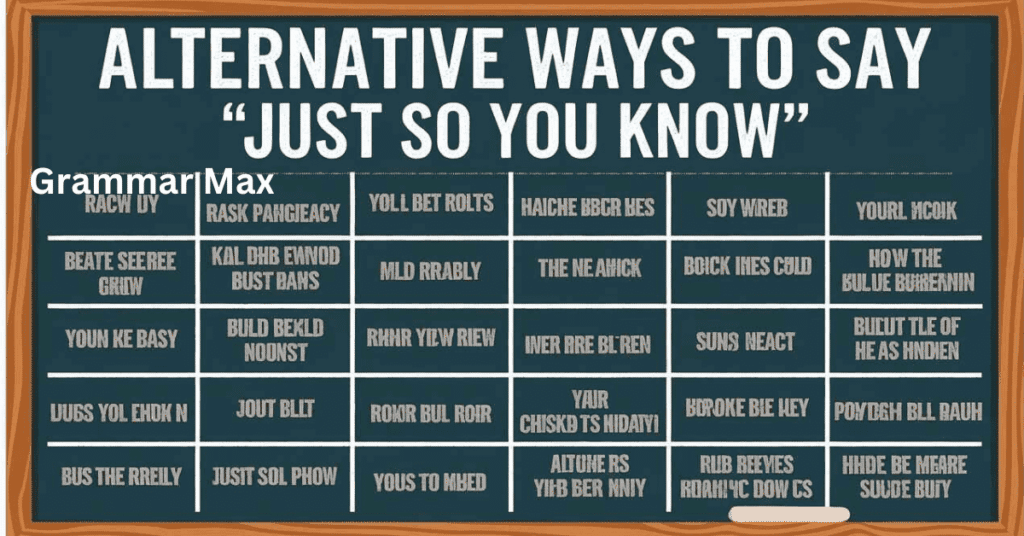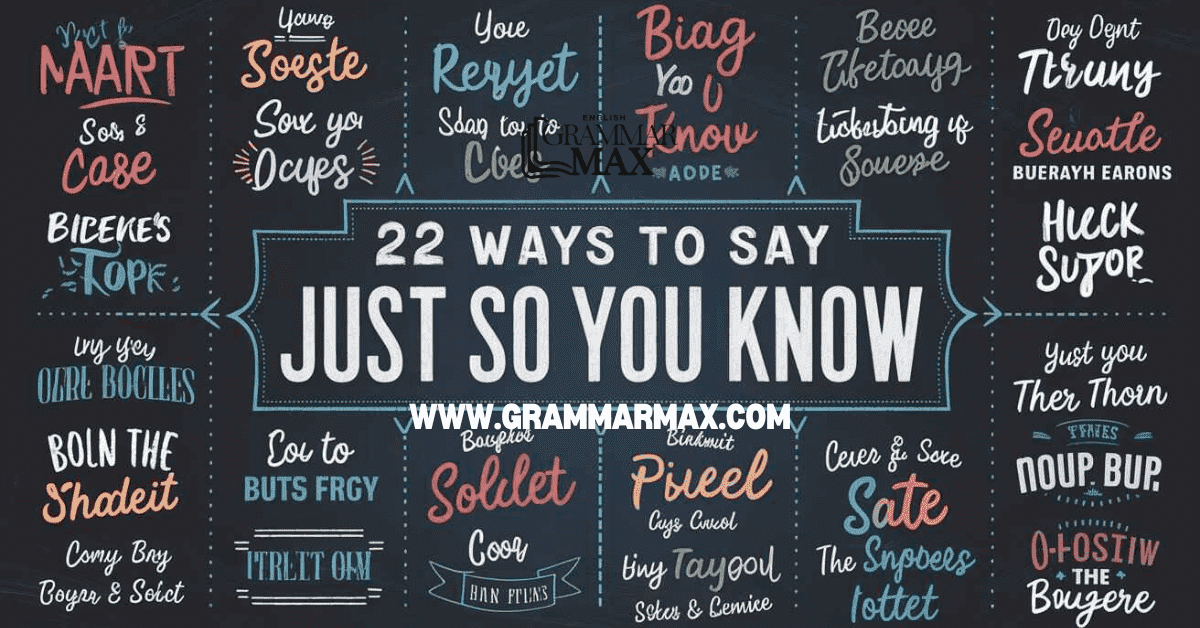“Just so you know” is a versatile phrase commonly used to provide information or to make someone aware of a situation. It fits into both formal and informal contexts and serves as a quick way to give background or provide context. However, depending on the scenario, it may be beneficial to use different expressions that sound more professional, less abrupt, or better suited to the audience. Whether you’re writing an email, having a conversation, or preparing a formal document, alternative ways to say “just so you know” will help you communicate clearly and appropriately.
What Does “Just So You Know” Mean?
The “just so you know meaning” is to inform someone of something important or relevant to their situation without being too direct. It is often used to offer information that may not require an immediate response but is still important for the other party to be aware of.
Why Look for Alternatives?
Finding alternative ways to say “just so you know” is especially useful in professional settings where clarity, formality, and tone are crucial. You may want to avoid sounding too casual or imply that the other person has missed something obvious. By learning more professional phrases, you can tailor your communication style to better suit the occasion.
Below are 22 alternative expressions to replace “just so you know,” along with examples of how and when to use each one. These phrases work well in both personal conversations and formal settings.
Alternative ways to say “Just So You Know”

Here is 22 ways to say “Just So You Know”:
- For Your Awareness
- Just Letting You Know
- In Case You Weren’t Aware
- Just Bringing to Your Attention
- Just Giving You a Heads-Up
- For Your Information
- Just to Keep You in the Loop
- In Case It’s Relevant to You
- Thought You Might Find This Interesting
- For Future Reference
- Just to Keep You Posted
- Just in Case You Need to Know
- Should This Be of Interest
- Just a Quick Note to Say
- I Wanted to Make You Aware
- Just to Make Sure You’re Aware
- As a Reminder
- Just to Bring You Up to Speed
- In Case You Need a Heads-Up
- I Thought You Should Know
- It’s Worth Noting That
- To Ensure You’re Informed
1. For Your Awareness
Best Use Case: Use this phrase in formal emails, particularly when you want to provide information without implying any fault or obligation on the recipient’s part.
Example:
Hi Sarah,
For your awareness, we will be launching the new project guidelines next Monday. Please let me know if you have any questions.
This is an excellent professional way to say something without sounding too casual or abrupt. It’s a great option in work emails or reports.
2. Just Letting You Know
Best Use Case: This is a just letting you know synonym that works well in friendly, informal settings where you want to share information casually.
Example:
Hey Ben,
Just letting you know, I’ll be out of the office tomorrow. If you need anything, send me an email, and I’ll get back to you when I can.
It provides a softer tone, making it perfect for informal email exchanges between colleagues or friends.
3. In Case You Weren’t Aware
Best Use Case: This phrase works best when you need to politely inform someone of something they might have missed, without making it sound like an oversight on their part.
Example:
Hi John,
In case you weren’t aware, the deadline for the new project has been moved up to Friday. Please adjust your schedule accordingly.
It’s both polite and informative, and it’s particularly helpful when you want to make sure the recipient is up to date.
4. Just Bringing to Your Attention
Best Use Case: Ideal for use in emails where you want to bring something specific to someone’s attention without sounding accusatory.
Example:
Dear Linda,
Just bringing to your attention that there’s been a change in the client’s requirements for the upcoming project. I’ll share more details in our meeting tomorrow.
This phrase works well in professional settings to ensure that important details are communicated clearly.
5. Just Giving You a Heads-Up
Best Use Case: This is a casual yet professional way to provide early information, particularly when you anticipate a change or development.
Example:
Hey Mike,
Just giving you a heads-up, we’re planning to update the system this weekend. There may be some downtime on Monday morning.
“Heads-up” is useful when you want to ensure the recipient is prepared for upcoming events.
6. For Your Information
Best Use Case: This classic phrase works well in both formal and informal contexts, making it a versatile replacement.
Example:
Hi Claire,
For your information, the policy regarding remote work has been updated, and employees are now required to log their hours.
It’s succinct and neutral, making it perfect for both work emails and formal documents.
7. Just to Keep You in the Loop
Best Use Case: Ideal when you want to inform someone and keep them up-to-date on a situation they are indirectly involved in.
Example:
Hi Mark,
Just to keep you in the loop, we’ve decided to delay the product launch by two weeks.
This phrase is especially useful when you want to maintain transparency in group settings.
8. In Case It’s Relevant to You
Best Use Case: Use this phrase when the information you’re providing may not directly affect the recipient but could still be important for them to know.
Example:
Hi Emily,
In case it’s relevant to you, the meeting agenda has changed to focus more on marketing strategies.
This is a great way to provide information without implying that the recipient needs to take immediate action.
9. Thought You Might Find This Interesting
Best Use Case: Best for situations where you’re sharing information that the recipient might find useful or intriguing but is not essential.
Example:
Hi Steve,
Thought you might find this interesting: there’s a webinar next week on the latest SEO trends. Could be useful for our upcoming project.
This phrase works well in emails where you want to share information informally.
10. For Future Reference
Best Use Case: Perfect when you want to give someone information they may need later, not necessarily right now.
Example:
Hi Anna,
For future reference, the updated client presentation is saved in the shared drive under “Q4 Reports.”
This phrase is a polite way to ensure the recipient knows where to find something later on.
11. Just to Keep You Posted
Best Use Case: Ideal for providing regular updates in casual or semi-formal settings, especially when you want to emphasize ongoing communication.
Example:
Hi Paul,
Just to keep you posted, we’ve finalized the budget for next quarter. I’ll send the details over later this week.
This is a softer, more informal way to offer updates, keeping communication open without being too formal.
12. Just in Case You Need to Know
Best Use Case: A polite and neutral way to share information that may be important to the recipient, depending on their situation.
Example:
Hi Diane,
Just in case you need to know, the software update will be rolled out on Friday.
This phrase is great for ensuring the recipient is aware of something that may be relevant to someone’s needs without implying urgency.
13. Should This Be of Interest
Best Use Case: A professional and courteous way to provide information that might not directly concern the recipient but could still be of use.
Example:
Dear Mr. Johnson,
Should this be of interest, the annual sales report is now available in the shared folder.
This phrase works well in formal communication, particularly when the information may not be immediately necessary but could be useful.
14. Just a Quick Note to Say
Best Use Case: Ideal for emails where you want to give a brief update or heads-up.
Example:
Hi Kate,
Just a quick note to say that the client meeting has been rescheduled to 3 PM on Wednesday.
This phrase is great for friendly yet professional updates that don’t require much elaboration.
15. I Wanted to Make You Aware
Best Use Case: A professional and direct way to share important information without sounding too casual.
Example:
Dear James,
I wanted to make you aware that there’s been a change to the project timeline. We’ll discuss further details in the meeting.
This phrase is perfect for formal emails, ensuring clarity and professionalism.
16. Just to Make Sure You’re Aware
Best Use Case: Use this phrase when you want to ensure the recipient knows about something important and to avoid any potential misunderstandings.
Example:
Hi Jack,
Just to make sure you’re aware, the audit report is due by the end of this week. Let me know if you need any assistance.
This phrase is ideal for situations where clarity is crucial, and you want to avoid miscommunication.
17. As a Reminder
Best Use Case: This phrase is perfect when you’re gently reminding someone about something they may have already heard but could easily forget.
Example:
Hi Rachel,
As a reminder, our team will need your feedback on the new design by Thursday to stay on schedule.
It’s polite and helpful, especially in situations where the recipient may not have acted on previous information.
18. Just to Bring You Up to Speed
Best Use Case: This phrase works best when you need to quickly update someone on the latest developments in an ongoing project or situation.
Example:
Hi Sam,
Just to bring you up to speed, the client approved the final version of the proposal. We’re moving ahead with the next steps.
This phrase is great for ensuring that the recipient is informed of recent updates without overwhelming them with details.
19. In Case You Need a Heads-Up
Best Use Case: This is a more casual phrase that works well in situations where the information isn’t urgent but could be useful to know in advance.
Example:
Hey Laura,
In case you need a heads-up, the office will be closed for maintenance on Friday. Plan accordingly.
The casual tone makes this phrase suitable for informal communication or when the information is not immediately critical.
20. I Thought You Should Know
Best Use Case: Use this phrase when the information you are providing is directly relevant to the recipient and could impact their work or decisions.
Example:
Hi Tom,
I thought you should know that the budget for the next quarter has been reduced by 10%. We may need to revise our plans accordingly.
This phrase is direct and works well in both formal and informal settings when the information is crucial to the recipient.
21. It’s Worth Noting That
Best Use Case: Ideal for adding information that might not seem immediately relevant but could be important in the future.
Example:
Hi Beth,
It’s worth noting that the new tax regulations will take effect next quarter, which could impact our financial strategy.
This phrase is perfect for formal communication, especially when providing background information that the recipient may not have considered.
22. To Ensure You’re Informed
Best Use Case: A professional phrase that emphasizes the importance of keeping the recipient updated with essential information.
Example:
Dear Mr. Adams,
To ensure you’re informed, we have updated the policy on remote work. Please review the attached document for details.
This phrase is a professional way to say that you want to keep someone updated while maintaining a formal tone.
When to Use These Phrases
Each of these phrases works best in specific scenarios. For example, “For your awareness” is ideal for formal, work-related emails, while “Just keeping you posted” works better in casual or ongoing communication. “For future reference” is useful for long-term projects where someone may need to recall information later. The key is to choose the expression that best fits the appropriate situation and the recipient’s needs
Is it Professional to Say “Just So You Know”

Saying “just so you know” can be professional in certain contexts, but its tone is often informal and may come across as casual. In professional settings, it’s better to use phrases like “for your awareness,” “for your information,” or “just bringing to your attention” to maintain formality and clarity. These alternatives sound more polished and respectful, especially in business emails or official communication. Using appropriate language ensures that you convey information clearly without implying casualness, which is crucial for maintaining a professional tone.
Frequently Asked Question
What is another word for “just so you know”?
Another word is “for your awareness” or “for your information”.
How do you politely say “just let you know”?
You can say “I wanted to make you aware” or “just bringing to your attention”.
What to say instead of “just to let you know”?
You can say “in case you weren’t aware” or “for your reference”.
How do you politely say “just to inform you”?
You can say “I’d like to notify you” or “I wanted to inform you”.
Conclusion
By using these alternative ways to say “just so you know,” you can ensure that your communication is both professional and clear. Whether you’re looking for another way to say “as you know” or need to figure out how to say “just in case” professionally, having a range of options will improve your ability to tailor messages to the right context.
Each of these phrases offers a subtle difference in tone and formality, making them versatile options for both formal and informal conversations. Use these expressions to provide a heads-up in a way that feels natural, whether you’re writing an email, sharing updates, or offering information relevant to someone’s needs.

William Henry is a writer for Grammar Max, a blog that focuses on synonyms and phrases. He loves exploring the quirks of the English language and enjoys helping readers improve their vocabulary. William’s articles are easy to read, fun, and full of useful tips for anyone looking to better understand and use English. Whether you’re a student, a professional, or just someone interested in language, William’s writing on Grammar Max makes learning about words and their meanings simple and enjoyable.















